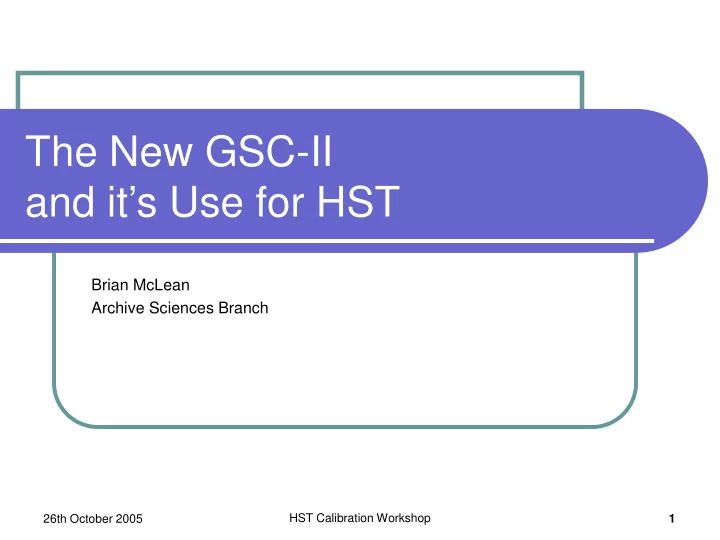

The New GSC-II and it’s Use for HST Brian McLean Archive Sciences Branch 26th October 2005 HST Calibration Workshop 1
Limitations of GSC-I (Reference Frame) Constructed from Sky Survey Plates (1976-1984) Used 3 different reference catalogs AGK3 (0° to +90°), SAOC (-60° to 0°), CPC (-90° to -60°) Bright stars from external catalogs Required GO’s to provide target coordinates in GSC-I reference frame 26th October 2005 HST Calibration Workshop 2
Limitations of GSC-I (Epoch) Guide Stars have proper motion so relative position errors between Guide Stars and Target are increasing with time Target acquisition failures for small aperture instruments GS acquisition failure rate increasing 26th October 2005 HST Calibration Workshop 3
Limitations of GSC-I (Depth) 20 million Stars to 15th magnitude in a single bandpass Not faint enough for ground-system software to know if 20 th magnitude blue stars were in FOV of a MAMA detector Health & Safety Issue Required visual inspection of target fields 26th October 2005 HST Calibration Workshop 4
Goals for GSC-II Reduce GS & SI acquisition failure rate Improve relative position errors Improve prediction of GS FGS magnitude Simplify procedure to provide coordinates Use standard reference frame Provide deeper catalog for automated “Bright Object Protection” 26th October 2005 HST Calibration Workshop 5
GSC-II Overview GSC-II constructed with more recent epoch plates POSS-II and AAO-SES (+ earlier surveys) multiple observations in multiple bands Improved astrometric reference catalogs on standard ICRS frame (ACT, TY2) Improved astrometric reduction technique Refraction pre-correction, equidistant projection, 2 nd order poly, correction mask 26th October 2005 HST Calibration Workshop 6
GSC-II Properties ~1 billion objects to plate limits in at least 3 bands (J,F,N) over entire sky Preliminary versions already in use for BOP ~0.25” (1-sigma) absolute astrometry over the entire sky on the standard ICRS reference frame ~0.3mag (1-sigma) stellar photometry ~95% classification 26th October 2005 HST Calibration Workshop 7
Cycle 15 Phase 2 Changes GO provides target coordinates on the ICRS reference frame New value for coordinate frame keyword in phase 2 proposal preparation [ICRS] NGSS uses keyword as switch for which GSC catalog to use for Guide Star Selection 26th October 2005 HST Calibration Workshop 8
Cycle 15 Coordinates Get target coordinates from ANY source using ICRS reference frame (e.g. GSC-II, SDSS, 2MASS, FIRST) Measure coordinates from deep CCD images using GSC-II as reference catalog for astrometry Measure target coordinates from DSS image using FITS WCS keywords which have GSC-II astrometry 26th October 2005 HST Calibration Workshop 9
Cycle 15 Tools Web and APT access to GSC-II to directly look up object coordinates Web and APT access to updated DSS Headers now include FITS standard WCS keywords that have ICRS-based astrometry GSC-I to GSC-II Conversion tool Provides GSC-II coordinate for GSC-I object ID or transforms RA,Dec using mean offset over the HST FOV 26th October 2005 HST Calibration Workshop 10
Current Status GSC 2.3 Catalog available DSS/WCS header updates completed Conversion tool available APT software updated Ground System Software updated On-orbit tests scheduled for late 2005 GSC-II will become default catalog for cycle 15 observations 26th October 2005 HST Calibration Workshop 11
Future Plans Update astrometry of images in HST archive to increase scientific value Almost all ACS and most WFPC images contain objects that are in GSC-II which allows an astrometric recalibration If recalibration is not possible then propagating the updated GS coordinates into the WCS will provide some improvement (see poster “A Significant Astrometric Improvement for Archival ACS Data using GSC-II” A. Koekemoer, B. McLean et al) 26th October 2005 HST Calibration Workshop 12
Recommend
More recommend